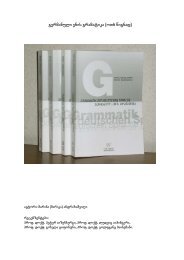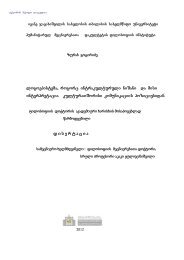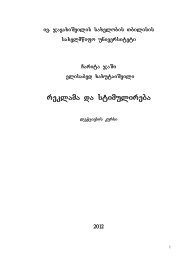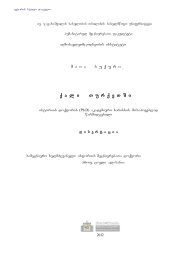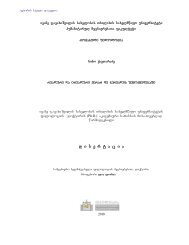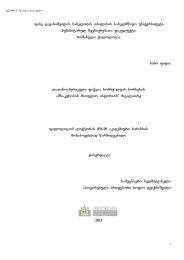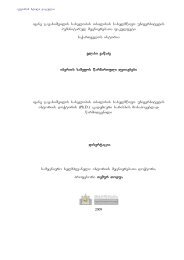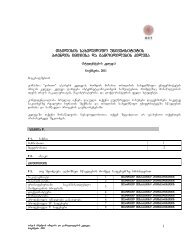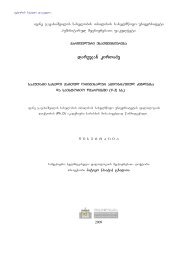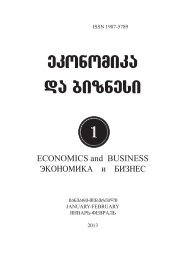- Page 1 and 2:
ivane javaxiSvilis saxelobis Tbilis
- Page 3:
krebuli eZRvneba zurab sarjvelaZis
- Page 6 and 7:
ise leqsikologia-etimologiis sistem
- Page 8 and 9:
zurab (zura) sarjvelaZe minda baton
- Page 10 and 11:
saCinoa is faqti, rom efTvime mTawm
- Page 12 and 13:
gvisturi xatis agebisas safuZvlad m
- Page 14 and 15:
TxvevaSi qarTul-zanuri erTianobis d
- Page 16 and 17:
`qarTvelur enaTa etimologiuri leqsi
- Page 18 and 19:
Iza Chantladze The Significance of
- Page 20 and 21:
13. a. froneli (a. yifSiZe), didebu
- Page 22 and 23:
1967 4. x da à grafemaTa da /Ã/ d
- Page 24 and 25:
1979 33. wyvetilisa da II xolmeobiT
- Page 26 and 27:
1987 68. eklesiaste (eklesiastes Zv
- Page 28 and 29:
1998 101. mca nawilakis erTi funqci
- Page 30 and 31:
134. galaktionis erTi leqsis zogi a
- Page 32 and 33:
usudan gersamia enaTmecnierebis sak
- Page 34 and 35:
soflebSi Caweril teqstebSi dasturde
- Page 36 and 37:
ga-Á-wuRG (Tiq Tis Tina `man mas i
- Page 38 and 39:
Rvrelis formantiseuli -S sakmaod xS
- Page 40 and 41:
Semdgom i > Á gadasvliT. vinaidan,
- Page 42 and 43:
when a compound preverb is added, t
- Page 44 and 45:
vfiqrobT, am mcenaris aRmniSvnel qa
- Page 46 and 47:
vaxtang imnaiSvili enaTmecnierebis
- Page 48 and 49:
imnaiSvilis werili, 4 romelSic, Zir
- Page 50 and 51:
17) endersis gadayeneba sabolood ga
- Page 52 and 53:
prozaSi am avtorebs zemoT dasaxeleb
- Page 54 and 55:
2) ugzoba, ufarexoba (g. tabiZe, VI
- Page 56 and 57:
ucxouridanaa Semosuli qarTulSi, maT
- Page 58 and 59:
7) kvireebi (j. beTaneli, gancdili
- Page 60 and 61:
Vakhtang Imnaishvili Some Questions
- Page 62 and 63:
arTi orkoli Rvini qofCuni, arTi pap
- Page 64 and 65:
Guram Kartozia The Formation of the
- Page 66 and 67:
• arakanonikuri TanxmovanTkompleq
- Page 68 and 69:
TanxmovanTgamyar `i~-sTan dakavSire
- Page 70 and 71:
literatura gigiberia 1958: e. gigib
- Page 72 and 73:
qeTevan margiani-subari enaTmecnier
- Page 74 and 75:
q. xecxEpiE (`albaT {mo}etacebina~)
- Page 76 and 77:
pirobiT-SedegobiTi I áÄÌóÒÉ _
- Page 78 and 79:
damana meliqiSvili enaTmecnierebis
- Page 80 and 81:
Cveni kvleva emyareba qarTuli enis
- Page 82 and 83:
#2. seriebis istoriuli urTierTmimar
- Page 84 and 85:
I vnebiTi gvari 1. Tu davtovebT say
- Page 86 and 87:
esiyvaruleba eamxanageba,.. da sxva
- Page 88 and 89:
zmnebisa da maTi konversiuli formeb
- Page 90 and 91:
usrulaspeqtiani myofadis gamoxatva
- Page 92 and 93:
amisobis sqema, xolo gvari _ gramat
- Page 94 and 95:
saklasifikacio principad aRebulia m
- Page 96 and 97:
Damana Melikishvili On the Grammati
- Page 98 and 99:
mentebi arc erTi interpretaciis sas
- Page 100 and 101:
z s Z c w zי sי Zי cי wי _ S j
- Page 102 and 103:
leqsikaSi /J/ gvxvdeba yvela dialeq
- Page 104 and 105:
amrigad, SeiZleba davaskvnaT, rom s
- Page 106 and 107:
place in Georgian - *J > z and *sib
- Page 108 and 109:
lic axasiaTebs mimReobebs da sawyis
- Page 110 and 111:
Ciqobava 1938: a. Ciqobava, Wanur-m
- Page 112 and 113:
qciis TvalsazrisiT da vlindebian id
- Page 114 and 115:
mimarTulebiT-micemiTis -a 5 SeiZleb
- Page 116 and 117:
warmoudgenelia -ad > -d procesi. 10
- Page 118 and 119:
erTi elia~sad~~ (qarTuli oTxTavis o
- Page 120 and 121:
magram maTi SerwymiT miiReba Tvisob
- Page 122 and 123:
Sdr., aseve: a. lomTaZe Tvlis (1987
- Page 124 and 125:
468). ufro adre gamoiTqva mosazreba
- Page 126 and 127:
viTarebis, mimarTulebisa da daniSnu
- Page 128 and 129:
Tariel Putkaradze On the Historical
- Page 130 and 131:
en ukuqceviTi nacvalsaxelis funqcii
- Page 132 and 133:
moqmedebis ganmcdelia ara is TviTon
- Page 134 and 135:
niSnavs, TviTon gansazRvrebiT nacva
- Page 136 and 137:
12) `Tavis saxlSi movida es kaci~;
- Page 138 and 139:
ogorc Cans, aTena//Tena//ena, eTina
- Page 140 and 141:
Winfried Boeder enaTmecnierebis sak
- Page 142 and 143:
Die empirische Basis der folgenden
- Page 144 and 145:
(4) (a) pirveliTgan iyo sityuaÁ (b
- Page 146 and 147:
habe (10c)’ bzw. ‘wovon ich ges
- Page 148 and 149:
‘[(1) Nun sage mir, wie die Welt
- Page 150 and 151:
also eine Art "Distanz", aber nicht
- Page 152 and 153:
(15) (1) Es war ein König (iyo xel
- Page 154 and 155:
aus Diamant, einem Weinkrug aus Rub
- Page 156 and 157:
spielt hier offensichtlich keine Ro
- Page 158 and 159:
Hinweis auf fehlende Systematizitä
- Page 160 and 161:
kontinuität aufheben; eine Diskont
- Page 162 and 163:
vinfrid boederi klasicisturi enobri
- Page 164 and 165:
iost giperti enaTmecnierebis sakiTx
- Page 166 and 167:
i TvalsazrisiT x-prefiqsis orive fu
- Page 168 and 169:
ხცემ: ცემა (2) ქ
- Page 170 and 171:
udo, romelic, bgeraTa dajgufebis fo
- Page 172 and 173:
ქრისტ. III,11: A137r,14;
- Page 174 and 175:
d) vnebiTi gvari, sazedao qceva:
- Page 176 and 177:
a) qcevis niSnis gareSe: გან
- Page 178 and 179:
ქრისტ. IV,13: 26vb,7; ა
- Page 180 and 181:
tipi gerhard deetersis mier qarTvel
- Page 182 and 183:
182
- Page 184 and 185:
z. sarjvelaZe, xanmet da haemet teq
- Page 186 and 187:
sxva centrebis SemTxvevaSi? 1 winam
- Page 188 and 189:
proeqtis farglebSi. kvlevis saboloo
- Page 190 and 191:
didgoris omSi daviT aRmaSeneblis mx
- Page 192 and 193:
sistematizaciis istoriaze, magram e
- Page 194 and 195:
Nino Doborjginidze From the History
- Page 196 and 197:
aRniSnuli Zirebis semantikaSic (fen
- Page 198 and 199:
masalis mixedviT mecnieri `mcodnes,
- Page 200 and 201:
maSasadame, sinonimuri mimarTebebi
- Page 202 and 203:
(abulaZe 1973). glovas efardeba ber
- Page 204 and 205:
Valerian Kvantrishvili Synonymic Pa
- Page 206 and 207:
fal Targmansac, Tandebulis Sinaarsi
- Page 208 and 209:
aramed mTargmnel-recenzentis stils.
- Page 210 and 211:
moi] CemTÂs cundrukebdes yovelni m
- Page 212 and 213:
cxrili # 2b. fsalmunTa wignis qarTu
- Page 214 and 215:
literatura i. abulaZe, Zveli qarTul
- Page 216 and 217:
a nomeriT, p. ingoroyva ar azustebs
- Page 218 and 219:
Cemi wakiTxva: r a [mar] b 20. ...
- Page 220 and 221:
[ars x̃ Rĩ]gan yo ars, xolo RmrT
- Page 222 and 223:
teqsti TiTqmis ar ikiTxeba, mxolod
- Page 224 and 225:
latalis da sinis leqcionarebi: da v
- Page 226 and 227:
H-1445: da ganixa[res] mowafeT[a],
- Page 228 and 229:
Sophio Sarjveladze Two Khanmeti Pal
- Page 230 and 231:
enaTmecnieruli argumenti damajerebe
- Page 232 and 233:
zmniswini lukas TavSia, radgan luka
- Page 234 and 235:
gakecil furcelze; es orfurcela mogv
- Page 236 and 237:
saTvis saerTo nawilebSi. es safuZve
- Page 238 and 239:
135a 1* maTe12,14 teqsti A135b 1 2
- Page 240 and 241:
5 10 15 20 25 [J65rb] [romlisaTOsca
- Page 242 and 243:
5 10 15 20 25 mas sabelica, aramed
- Page 244 and 245:
A138a da xityodes osa na r‚i xa(r
- Page 246 and 247:
A140a (x‚ igi maT xetyoda) (r‚i
- Page 248 and 249:
Mzekala Shanidze The Homily "On Jea
- Page 250 and 251:
ebiTis niSnad -a sufiqsi gvxvdeba g
- Page 252 and 253:
juanSerisave Txzulebis sxvadasxva x
- Page 254 and 255:
sarTiT iwarmoebda; xolo is uniSno d
- Page 256 and 257:
� gaikrtnas, Cajdes vards Sua, ma
- Page 258 and 259:
aseve ar aris motivirebuli -e da -a
- Page 260 and 261:
� va Tu gaviWre, gaWrilsa sada, g
- Page 262 and 263:
q. cx. I _ qarTlis cxovreba, I, teq
- Page 264 and 265:
ana xaranauli enaTmecnierebis sakiT
- Page 266 and 267:
faqtorebic, romlebic zemoqmedebas a
- Page 268 and 269:
saTargmni sityvis semantikas. 3 amg
- Page 270 and 271:
eu;cesqai aRTquma 2, euvch, aRnaTqu
- Page 272 and 273: zemoCamoTvlili semantikuri jgufis s
- Page 274 and 275: paralelur adgils (3421, 8011) eyrdn
- Page 276 and 277: Ana Kharanauli The Vocabulary of th
- Page 278 and 279: amave leqsikonSi literaturul wyaroe
- Page 280 and 281: xis erovnuli xasiaTis gamosavlenad.
- Page 282 and 283: gancalkevebul erTeulTa Tavgadasaval
- Page 284 and 285: (30): mas uSmago vin miendos, vin m
- Page 286 and 287: gavixsenoT akakisY`gamzrdeli~: `Sen
- Page 288 and 289: "Freundschaft" ist eine der wichtig
- Page 290 and 291: vania da mravalferovani (Sinaarsis
- Page 292 and 293: jajRani _ es sityva ar aris etimolo
- Page 294 and 295: `metyvelebas~; 1220 wels odnav Secv
- Page 296 and 297: dialeqtSi RurRuli `gajavrebas, Cuma
- Page 298 and 299: maRal tonalobas gamoxatavs; sainter
- Page 300 and 301: amaz qurdaZe enaTmecnierebis sakiTx
- Page 302 and 303: saerTod kavkasielis da, bunebrivia,
- Page 304 and 305: arc am sityvebis ganmartebisas da a
- Page 306 and 307: ЧОНГУРИ - гей, приех
- Page 308 and 309: usudan asaTiani enaTmecnierebis sak
- Page 310 and 311: seriebs Soris arsebuli sxvaobebi. u
- Page 312 and 313: manis rigis piris niSnebi. axla, Tu
- Page 314 and 315: 5. mravalpirianobis ZiriTadi funqci
- Page 316 and 317: SemTxvevaSic, rodesac zmna aris erT
- Page 318 and 319: cesebis dafiqsireba da aucilebelia
- Page 320 and 321: Alice C. Harris SUNY Stony Brook en
- Page 324 and 325: (2) mo-v-k’l-en "I killed them" m
- Page 326 and 327: Notes 1 The research reported here
- Page 328 and 329: Zveli qarTuli enis aRwera warmoadge
- Page 330 and 331: * * * eTer soselia, semantikuri uni
- Page 332 and 333: zurab sarjvelaZe _70 Sinaarsi daman
- Page 334 and 335: sofio sarjvelaZe _ xelnawerTa erovn
- Page 336: gamomcemlobis redaqtori cira jiSkar



